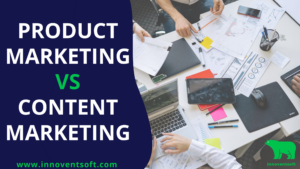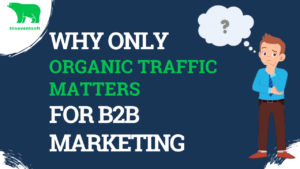Introduction
Today, every B2B and B2C organization wants to create an online presence for their brand and eventually create sales. With growing regulations to secure citizen’s private data, Apple’s ios privacy change and Google cookieless privacy measure, have put pressure on marketers to explore other online avenues other than Ads for lead generation. Marketers consider many channels such as events, webinars, social media, email marketing, SDR outreach, inbound/outbound marketing, etc to generate leads. But recently every marketer is turning to organic marketing for quality lead generation and high marketing ROI. In this blog, we will understand details about organic marketing and share 7 steps to achieve it.
What is Organic Marketing?
Organic Marketing is a structured approach to understand target customers’ lifecycle (refer the image below), prepare content for the entire customer lifecycle, and then promote the content without paid avenues like Google Ads or social media Ads. Compared to paid media, the results such as getting leads and increasing revenues will be higher and more sustainable.
Organic marketing needs a structural approach to produce trustworthy and relevant content that matters to the audience. Hence, it demands to bring specific cultural changes to the B2B marketing functions.

We recommend generating valuable content with a customer-first mindset and then thinking of SEO and digital marketing to achieve organic marketing. We recommend B2B marketers follow 7 steps to attain organic marketing.
Why Organic Marketing is important today?
Growing regulatory compliance and new policies to protect users’ personal information have led companies like Apple, and Meta to curb their attribution and profiling techniques. With that step, B2B marketers realize the ineffectiveness of Ads. Further Google has plans to phase out 3rd party cookie by the end of 2023. Such regulatory changes has increased the importance of organic marketing today. Secondly, as per a study by Statista, the overall Ad spends are decreasing in US as per the image below.

We don’t suggest stopping Ads but understanding the potential of Organic Marketing wrt to Paid Marketing and combining both of them judiciously.
Every B2B marketer has possibly considered organic marketing as a primary channel to acquire leads. For an apparent reason- more than 50% of the website traffic comes from organic mediums ( i.e., from Google Search). So there is a big chance of ensuring consistent click-through rates (CTR) and achieving high ROI through better conversion. With all the visitors’ and user flow metrics, organic marketing has become the most dependable channel to acquire leads.
Bursting myths about Organic Marketing
Often marketing team misunderstand Organic Marketing as the process of optimizing existing content or just content marketing. Well, Organic Marketing is:
- not SEO, but is
- an arm of digital marketing,
- and includes content marketing.
SEO and content marketing are the constitutional ingredients of organic marketing. Growing organically involves creating and distribution of content in free channels including social media or any other unpaid channels.
7 Steps to achieve Organic Marketing
Organic marketing encompasses everything in marketing without paying anything to any media. The strategy involves a careful approach to creating the right content and promoting it across social media, email, and other channels. Image below represents the 7 steps for achieving organic marketing.

1. Understand the Customer Life-cycle
Identify customer needs or pain points and try to identify the status-quo ( or as-is) that troubles them the most. And eventually, think how they will perceive your product/services in various buying cycle stages, right from getting aware.
2. Prepare Content Strategy
Content is the heart and soul of organic marketing. There can be various content like blogs, videos, infographics, free assessment tools, whitepapers, etc. Prepare trustworthy content topics to engage the target audience at each customer lifecycle stage, right from awareness to action to word-of-mouth.
3. Generate Content
Create content quickly and spend less time on multiple reviews. As long as facts are shown in a story-telling format, and the content is grammatically correct, the audience appreciates it. So don’t overthink and get those content pieces out. No content is a small range, and no content is extensive content.
4. Align Content with your Positioning and Value messaging
Once you create the content, ensure that your content and messaging are aligned with the product’s positioning and messaging. And also, ensure there are enough promotional materials for readers ( like eBooks, webinars, product trials, etc.) to scan and sign up for.
5. Publish and Promote
Once the content is ready, publish it and promote it across social media and 3rd party sites. Another item that must be considered in this step is ensuring the marketing technology (website, CRM systems, etc.) is behaving correctly. If the webpages are not optimized from technical pov or the CRM forms, they do not work correctly. It may provide a poor user experience, severely impacting your ability to convert prospects.
6. Monitor and Measure
B2B organizations have to measure their content performance using metrics such as website traffic and conversions. The results will be very effective since organic marketing fosters a robust and authentic relationship (unlike Ads).
7. Optimize and Improve
This is the step where you take the content and do search engine optimization(SEO) to gather more results. The main objective of SEO is to help Google understand your content better. You can label your content and web pages using proper keywords, appropriate meta tags, and meta descriptions. Google algorithms are designed to provide the best content to the end-user, for which it uses keywords and meta titles to analyze content. To optimize your content constantly to ensure your content appears at the top for the audience, who can eventually convert and become a lead.
Executing all the 7 steps mentioned above is not a one-person job; it certainly needs a team and proper planning and execution. Let us quickly look at the team that will ( or should ) get involved in preparing a content strategy for organic medium.
Team collaboration required to grow organically
To achieve organic marketing, B2B marketers need to adopt the new culture and new way of thinking and work towards achieving the common goals. Team which needs to collaborate to help their organization grow organically are:
- CMO
- Product Marketing Manager
- Demand Gen/Campaign Manager
- Digital Marketing Manager
- Product Manager
- Customer Success Manager
With the team working together, B2B organizations can ensure the messages are aligned towards product and market. Consequently, you will gain more traffic to your website and expect leads or form-fills.
More often than not, B2B marketing teams catch themselves under severe and continuous discussion on the notorious topic- Where shall we focus more- Organic or Paid marketing?
Organic Marketing vs. Paid Marketing: Which one to choose?
The answers between organic and paid marketing have to be prioritized depending on organizational maturity and goals. Both are equally important, and focus can deviate based on what an organization is trying to achieve.
Although it is crucial for leveraging Organic Marketing for engaging audiences and nurturing leads, paid marketing takes a top priority while running a campaign or hold a top brand position through top-of-mind.
Paid search results are shown at the top of Google’s page ( also known as Search Ads), or they can be visible as a banner or boosted post in the side-lines of various pages ( known as Display Ads). You generally have to pay per click (PPC), which means every time a user clicks on an Ad, you have to pay for the click. This is a quick way to reach a mass audience, but the Search or Display Ads placement will be based on how far the Ads are relevant and optimized. Paid Ads effectively generate quick results like drawing “inorganic” traffic. But they may not be very effective in form-fills and conversions. Besides, they tend to lose their shine as soon as payment stops or your credit card reaches its limit (volatile, ain’t it?). On the other hand, Organic Marketing is known for its longevity.
Compared with organic marketing, paid marketing will lack the ease of investigation. With organic marketing, you can get many metrics on the consumer journey and decide how to optimize and improve. But with PPC Ads, the scope of improvement is minimal.
Every company has a limited budget but unlimited knowledge in the domain they are working in. So you can run limited PPC Ads and can target specific topics. In contrast, with organic marketing, you can write content related to various issues wrt to customers’ pain points to improve brand trust and loyalty. And often, with the Ads, users tend to ignore or feel like they are pushed to click something inauthentic instead of getting genuine help.
Now, let us compare them head-on and see which will make sense for what kind of scenario.
Organic marketing vs Paid marketing:

Both the strategies have their pros and cons. Though Paid Marketing is somewhat like spray-and-pray, you get results instantaneously. On the other hand, Organic Marketing takes time to mature but gives sustainable results and high returns over time, and at almost no cost.
Conclusion
To reap the benefits of the world, organizations must use a strategy to combine Paid and Organic Marketing, something we refer to as the Integrated Marketing approach. We recommend promoting content in organic search, taking the best performing content, and promoting them through Ads. That way, you can strike a good balance between the two and save money.
Using our Intelligent Content Marketing (ICM) platform, we are helping American unicorns and emerging India startups increase their website visibility and generate leads with better customer experience. If you want to start Organic Marketing, contact us here.
Academy Resources for Organic Marketing
If you are interested to understand organic marketing and apply it for your organization, then the below course will be of interesting to you. There are short and sweet 7 chapters which we felt are enough for any product marketers or digital marketers to grasp organic marketing in less 2 hrs and start practicing from the day 1.
(Please note: We are a startup with limited money to burn, so we chose to keep our training videos authentic over production grade)





